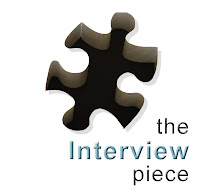 A week or so before each interview, I give the interviewee a list of basic questions that I intend to ask. This primes the pump, gets them thinking, and puts them at ease about the process, reassuring them that I’m not out to ambush them or dig up dirt. I’m not Maury Povich (God forbid!)
A week or so before each interview, I give the interviewee a list of basic questions that I intend to ask. This primes the pump, gets them thinking, and puts them at ease about the process, reassuring them that I’m not out to ambush them or dig up dirt. I’m not Maury Povich (God forbid!)But neither am I Barbara Walters. So to make sure I get everything right I use a digital recorder.
This may not be practical or safe in some of your locations. If it arouses suspicion or dampens the spontaneity of the conversation, it’s simply not worth it. But, if it is at all possible, I highly advise it. It is far superior to taking notes, allows you to give your full attention to the interviewee, and guarantees your accuracy.
I ALWAYS ask their permission to use a recorder. Most people agree when I explain why and how I will use the recording. I transcribe every interview, clean up the inevitable grammatical errors, sentence fragments, and other assorted verbal weirdnesses that everyone exhibits in normal conversation. Yes, this is time-consuming, but trust me, it will save you HOURS of work later on when you are actually writing.
Then I give each interviewee a hard copy of the transcript for their review and editing BEFORE CHOOSING ANY QUOTATIONS FOR PUBLICATION. It is amazing how relieved everyone is about this. If you’ve ever been misquoted, had your comments taken out of context, or winced at a slip of the tongue or terrible grammar, you know why.
Self-editing allows interviewees to correct inaccuracies, fix misspellings of unfamiliar names, and eliminate things they now wish they hadn’t said - which happens a LOT. Most interviewees become very comfortable as the conversation progresses and tend to reveal more than they expect to. A few transcripts have been returned to me looking like the CIA got hold of them. Sometimes I’m really sad about this because the discarded stuff isn’t “bad.” Some of it is really funny, or poignant, or devastatingly real. But - sigh - I stick to my promise and don’t use it if the interviewee is uncomfortable with it showing up in black and white.
When the edited transcripts are returned, I highlight all the possible usable quotations and categorize them according to a basic outline of topics, assigning colors to each topic and using colored sticky flags on the pages to tag every highlighted quotation so I can find it easily when I start writing.
The final extraction of these quotations can be done electronically with the original docs on your computer. Quotations can be cut and pasted directly from them into your draft, cross-checking them with the edited hard copies to incorporate any changes. The “find” feature in Word is indispensable for this.
Meanwhile, you should be actively collecting other puzzle pieces. More about that next week.

3 comments:
First of all I had to do a google search for Maury Povich. Chalk that up to another show I've lived happily without. Ugh.
I just wish I had tape recorded conversations with my children from back when....
These are very helpful tips. Maybe this summer will provide time to do some serious research. Thanks for teaching us here.
I agree with Jamie Jo. These are helpful tips. I interviewed someone for an article I wrote last winter, and I wish I'd had the chance to read this.
My husband is doing interviews for PhD research, and I'm going to forward these posts to him.
Thanks for your work.
YAY - so glad this is helpful to y'all! I felt like the first person to trudge through a 6 ft. snowdrift when I did my first book...HA!
Post a Comment